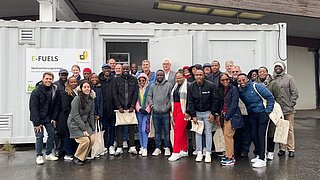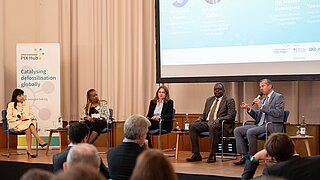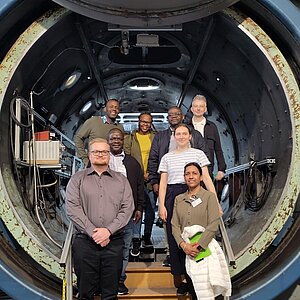Study tour on green shipping in Northern Germany

Kenyan and South African delegations attended the Hamburg Sustainability Conference and the World Ports Conference. The conferences and a subsequent study tour gave the participants the opportunity to connect with green shipping initiatives in Northern Germany. The study tour was made possible by the IKI-funded International PtX Hub.
Government delegates from Kenya and South Africa got a first-hand look at advances in green shipping technology, hydrogen production and sustainable port operations in Germany during a week-long study tour. From discussions at the Hamburg Sustainability Conference and the IAPH World Port Conference to technical site visits, it was clear that the maritime sector is embracing the challenge of defossilisation, but that challenges remain that need to be addressed as soon as possible.
Start at the Hamburg Sustainability Conference

The study tour began at the Hamburg Sustainability Conference. Around 30 delegates from Kenya and South Africa attended the inaugural edition of the high-level conference, which was opened by Olaf Scholz, Chancellor of the Federal Republic of Germany. The conference addressed critical global sustainability issues such as sustainable shipping and aviation, biodiversity, and youth employment.
Delving deeper into the week's theme of sustainable maritime transport, the International PtX Hub's official side event highlighted opportunities, challenges, and existing solutions, such as the H2Global mechanism for the transition to sustainable shipping. The high-level speakers and panellists emphasised the need for shared ambition, technological advances and closer cooperation to enable the defossilisation of a sector such as shipping.
Green shipping and green hydrogen

A boat tour then introduced the delegates to the Port of Hamburg and its green ambitions. The visit was led by the Hamburg Port Authority and was attended by the Secretary-General of the International Maritime Organisation, Arsenio Dominguez. Three cruise terminals, which welcome 270 ships and 1 million passengers a year, are already supplied with electricity from the mainland. This is crucial as cruise ships require 15 MW and container ships around 5 MW of energy.
The next day, GP JOULE, a company pioneering the green hydrogen value chain 300 metres from the North Sea, welcomed the delegations. Five electrolysers integrated with wind farms are already producing green hydrogen and supplying local buses and trucks. The aim is to build a regional ecosystem in North Frisia, which has become one of Germany's most promising regions in recent years, largely due to the development of renewable energy.
Green shipping was also a much-debated topic at the World Ports Conference. At the PtX Hub panel, government and port authority representatives from Kenya, South Africa and India shared their perspectives. Clear policy guidance, regulatory frameworks and market-based economic instruments are needed. However, effective collaboration between stakeholders at local, national and international levels will be key to success.
The visit ends in Bremerhaven

Later in the week, the South African and Kenyan delegations visited the electrolyser test field of the Hydrogen Lab Bremerhaven of the Fraunhofer Institute for Wind Energy Systems. Across the harbour, the ttz Bremerhaven Technology Transfer Centre presented its laboratory and electrolyser. In particular, MariSynFuel, a large-scale e-methanol demonstration plant that produces green marine fuel using renewable carbon from a nearby biogas plant, was a great example of regional cooperation between different research and business institutions.
Finally, the delegation visited the container terminal in Bremerhaven, one of the largest in Europe. The Europort Group, which operates three terminals in Bremerhaven, shared some of their visions for decarbonising port operations. The day ended with a visit to the start-up company Green Fuels GmbH, which is about to complete the construction of a commercial green hydrogen production plant and a green hydrogen filling station near the port.
The week-long delegation tour provided an invaluable opportunity for knowledge exchange and capacity building to accelerate the transition to sustainable shipping. Sustainable marine fuels, shore-side electrification and green hydrogen are among the key solutions that will drive the transition, but their success will depend on effective policy, regulation and cross-border cooperation. As seen throughout the visit, regional cooperation – whether through projects like MariSynFuel or innovations in port management – demonstrates the potential for green corridors and coordinated efforts to scale these solutions globally. The journey to net-zero shipping is underway, and continued international partnerships will be essential to achieving the ambitious goals set for 2050.
The link has been copied to the clipboard
Contact
IKI Office
Zukunft – Umwelt – Gesellschaft (ZUG) gGmbH
Stresemannstraße 69-71
10963 Berlin






![[Translate to English:]](/fileadmin/_processed_/7/2/csm_20241213_RE_Anlage_Dach_Privatsektor_Initiative_BMWK_2b2c722b5a.jpg)

